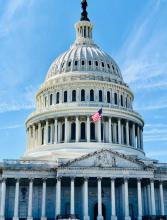The Fight for EB Care: We Need Your Voice Now!

Critical healthcare policies that could significantly improve the lives of people with Epidermolysis Bullosa (EB) and other rare diseases are being left out of federal budget negotiations. These policies were included in temporary funding bills last year—but were removed at the last minute. The same thing happened again in March. And now, it looks like they won’t be part of the final budget plan either.
Why This Matters
Without these protections, access to EB treatments and essential wound care products could be drastically limited. Congress is making decisions that will affect how, and if, people with EB can get the care they need.
We need your help to show lawmakers the real impact of these choices. Your voice can make the difference.
If you or your loved ones have been affected by any of the following issues, we ask that you share your experience in a short video:
Access to Out-of-State Doctors
Congress is blocking a policy that would allow state Medicaid programs to reimburse out-of-state doctors. This is a major issue for rare disease communities, especially when only a handful of specialists exist across the country.
For example, new gene therapies—like the potential treatment for EB being developed by Abeona Therapeutics—will only be available at a few centers in the U.S. Without this policy change, people who don’t live near one of those centers may not be able to access treatment because their Medicaid won’t cover care across state lines.
Loss of Molnlycke Products in California
California’s Medicaid program has removed Molnlycke wound care products from its approved list. Other states may follow as they look to cut costs. While there are alternatives to Molnlycke products, limiting choice for wound care is deeply concerning.
Government Scrutiny of VYJUVEK™ Access
Some people using VYJUVEK™ have been contacted by officials from the Department of Justice or Medicaid’s efficiency office. With Congress under pressure to make major budget cuts, they may be looking to limit access to effective, but costly, treatments.
What You Can Do
Please take a moment to record a brief video on your phone sharing how these issues have affected you. Include your first name and the state you live in; no other personal information is necessary.
We need real stories from the EB Community to demand change. Lawmakers need to see the devastating impact of these barriers—and the only way to do that is through your voice.
Thank you for being a powerful advocate for our EB Community!



